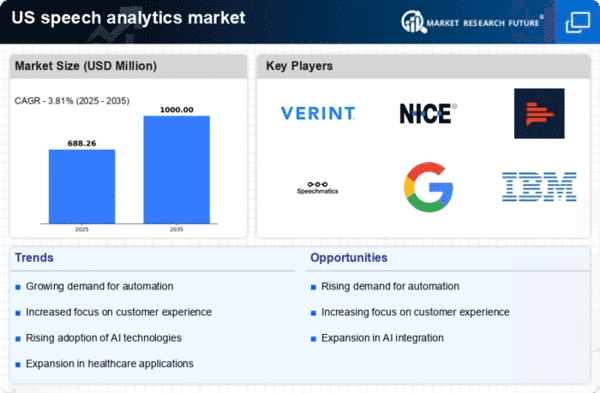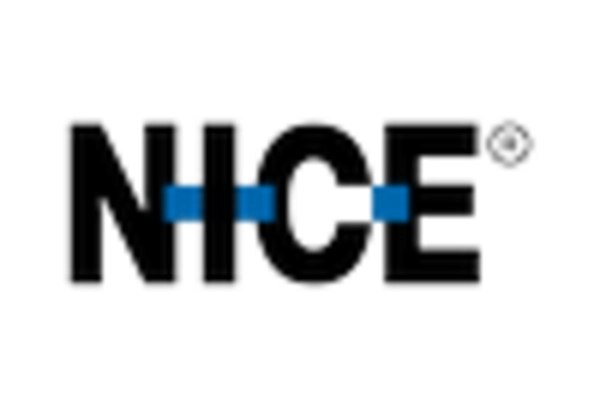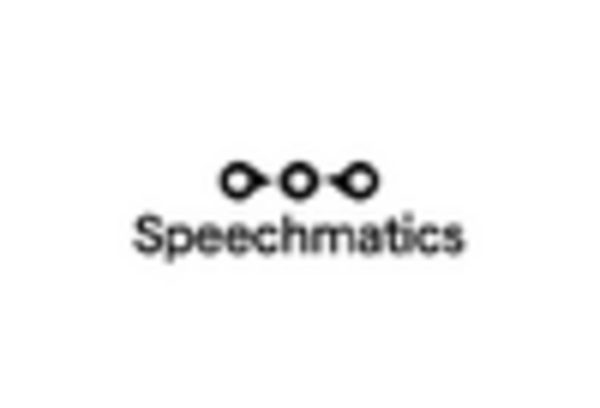Rising Need for Operational Efficiency
The pursuit of operational efficiency is a significant driver in the speech analytics market. Organizations are increasingly leveraging speech analytics to streamline processes, reduce costs, and enhance productivity. By analyzing call center interactions and other customer communications, businesses can identify inefficiencies and areas for improvement. This trend is particularly pronounced in industries such as telecommunications and customer service, where operational efficiency directly impacts profitability. Data suggests that companies utilizing speech analytics can achieve up to a 25% reduction in operational costs. As organizations continue to seek ways to optimize their operations, the speech analytics market is poised for continued growth.
Regulatory Compliance and Risk Management
Regulatory compliance and risk management are becoming increasingly critical in the speech analytics market. Organizations are under pressure to adhere to various regulations, particularly in sectors such as finance and healthcare, where data privacy and security are paramount. Speech analytics tools are being utilized to monitor compliance with these regulations by analyzing customer interactions for potential risks and ensuring that organizations meet legal requirements. This focus on compliance is likely to drive investment in speech analytics solutions, as companies seek to mitigate risks associated with non-compliance. The market is expected to see a growth rate of around 12% as organizations prioritize compliance and risk management.
Advancements in Natural Language Processing
Advancements in natural language processing (NLP) technologies are significantly influencing the speech analytics market. As NLP capabilities improve, organizations are able to extract more nuanced insights from spoken language, enabling deeper analysis of customer interactions. This is particularly relevant in industries such as finance and healthcare, where understanding customer sentiment and intent is crucial. The integration of sophisticated NLP algorithms allows for more accurate transcription and sentiment analysis, which can lead to better decision-making. The speech analytics market is projected to grow by approximately 15% annually, driven by these technological advancements that enhance the ability to analyze and interpret spoken data.
Increased Adoption of Cloud-Based Solutions
The shift towards cloud-based solutions is a key driver of growth in the speech analytics market. Organizations are increasingly adopting cloud technologies to facilitate scalability, flexibility, and cost-effectiveness in their operations. This transition allows businesses to access advanced speech analytics tools without the need for extensive on-premises infrastructure. As a result, small and medium-sized enterprises are entering the market, contributing to its expansion. Recent statistics indicate that cloud-based speech analytics solutions are expected to account for over 60% of the market share by 2026. This trend underscores the importance of cloud technology in shaping the future of the speech analytics market.
Growing Demand for Customer Experience Enhancement
The speech analytics market is experiencing a notable surge in demand driven by the increasing emphasis on enhancing customer experience. Organizations are increasingly recognizing the value of analyzing customer interactions to gain insights into preferences and behaviors. This trend is particularly evident in sectors such as retail and telecommunications, where companies are leveraging speech analytics to improve service quality and customer satisfaction. According to recent data, businesses that implement speech analytics report a 20% increase in customer retention rates. This growing focus on customer experience is likely to propel the speech analytics market forward, as companies seek to differentiate themselves in a competitive landscape.

















